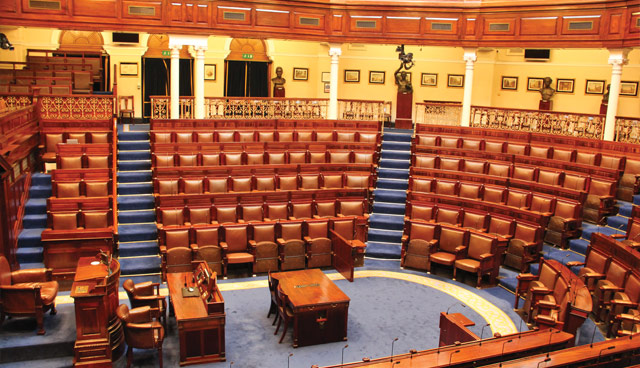Motions of confidence


The ability to pass a confidence motion or a supply (budget) bill is the minimum support required for a government to survive and indicates whether it retains the support of a majority of members in the Dáil. eolas examines confidence motions in the context of Dáil Éireann.
Often, a motion of no confidence arises when the opposition deems a government or a member of government no longer fit to hold office, commonly because of a failure of obligations or inadequate performance.
In ‘Accountability in Irish Parliamentary Politics’, Muiris MacCarthaigh outlines: “Motions of censure or ‘no confidence’ in the Government or the Taoiseach are used to attack the policies of the Government and result in a vote.” As a method of countering such a motion, the Government will often replace or amend it with its own motion of confidence through its command of the legislative agenda.
Constitution
If a motion of no confidence in the Taoiseach or the Government is passed, or a motion of confidence is defeated, the Constitution dictates that the both the Taoiseach and the Government must then resign.
Articles 28.10 and 28.11.1° of Bunreacht na hÉireann state: “The Taoiseach shall resign from office upon his ceasing to retain the support of a majority in Dáil,” and “If the Taoiseach at any time resigns from office the other members of the Government shall be deemed also to have resigned from office.”
In this scenario, a replacement Taoiseach can be elected by the Dáil or else it is dissolved, and a general election held. At the same time, Article 13.2.2° provides that the President has absolute discretion on whether or not to dissolve the Dáil on the advice of a Taoiseach who has ceased to retain the support of a majority in Dáil Éireann.
In November 1982 and a decade later in November 1992, confidence motions brought down the governments of the day, each time resulting in an election. On another occasion (January 1982), the minority coalition government fell due to a loss of supply after failing to pass a budget resolution. However, it has been more common for a Taoiseach to pre-emptively dissolve the Dáil, thwarting a confidence motion which seems likely to be lost.
Most recent
The most recent motion of confidence was put to the Dáil in September 2018. The Sinn Féin motion of no confidence in Housing Minister Eoghan Murphy TD was narrowly defeated (by 59 votes to 49) after Fianna Fáil deputies abstained.
Even when a motion of no confidence is unlikely to succeed in the vote, it is an opportunity for the opposition to attract publicity during the preceding debate. Likewise, the timing of a motion of no confidence is a matter of political intrigue as they are subject to time limits.
Indeed, speaking with eolas during the 2018 summer recess (prior to September’s censure motion), Sinn Féin’s housing spokesperson Eoin Ó Broin TD indicated: “You only get to table a motion of no confidence once every six months… We were looking at the motion in and around the run up to the summer.
“It became increasingly clear that Fianna Fáil weren’t going to back it, so we knew we would lose the vote and therefore, if an even bigger housing scandal emerged in a month or two months, [Sinn Féin] couldn’t table [another motion]. We took a tactical decision that we would not table it at that point of time – we never withdrew the motion, so people are clear.”
Standing Orders
In fact, the Standing Orders of Dáil Éireann, or the rules which govern the work of the Dáil, determine that no member may re-open a discussion on a question that has already been discussed in the preceding six-months. However, Standing Order 58 (2) states: “Notwithstanding paragraph (1), the Ceann Comhairle shall have discretion to apply a shorter period than six months to the business specified below in accordance with established practice.” One of the three specifications determined is “a motion of confidence in the Taoiseach and/or the Government or a member of the Government”.
Regardless, the subsequent Sinn Féin motion – which read: “That Dáil Éireann… has no confidence in the Minister for Housing, Planning and Local Government and calls for him to be removed from office” – failed to attract the support of Fianna Fáil who have upheld their confidence and supply arrangement with Fine Gael. The result of such support would have breached the agreement and provoked a collapse of the Government.
“If the Taoiseach at any time resigns from office the other members of the Government shall be deemed also to have resigned from office.”
Indeed, while acknowledging that “Ireland is in the middle of a fundamental housing crisis”, Fianna Fáil housing spokesman Darragh O’Brien TD outlined: “Ultimately, my party and believe it would be a deeply irresponsible action to collapse the Government weeks before the budget in the middle of delicate Brexit negotiations.”
Meanwhile, Fine Gael deputies derided the motion as personalised political “stunt”, while Minister Murphy himself indicated: “I won’t be distracted by populist nonsense and I won’t be hounded out of office”.
Division
Following the debate on the confidence motion in Minister Murphy, the question was put and the Dáil was divided by electronic means. However, Sinn Féin Deputy Aengus Ó Snodaigh alluded to “the substantial number of deputies on the ‘staon’ [or ‘abstention’] list” and proposed that the vote be taken by other than electronic means. Ceann Comhairle Seán Ó Fearghaíl acceded to the request, a manual vote was taken, and the question declared lost.
Divisions in the Dáil may be conducted by electronic means, except in the matter of:
- the election of a Ceann Comhairle;
- the nomination of the Taoiseach and members of the Government; or
- a motion of confidence in the Government.
Standing Order 70 details that, when a Ceann Comhairle puts a question to the Dáil, “he or she shall judge from the answers to his or her questions, and declare the result, in his or her opinion, of the putting of the question”.
However, after the Ceann Comhairle declares a result, a dissenting member can demand a division upon that question, “whereupon the division shall, subject to paragraph (3), be deferred until the weekly division time on the next Thursday following, at 12:47pm”. Although, a motion of confidence in either the Government or a member of the Government is also one of six matters listed in paragraph (3) in which a division is taken forthwith.
Constructive vote of no confidence
With intriguing foresight, the 1996 report of the Constitution Review Group, chaired by TK Whitaker, recommended that the introduction of a constructive vote of no confidence be given serious consideration. Contextualising this recommendation, the Whitaker report notes that “the ‘snap’ election has been a rarity and seems destined to be rarer still as coalitions rather than single-party governments become the norm” and contends that the risk of government formation being deadlocked is serious.
The opportunity for deadlock emerges when a Dáil reassembles after a general election and no candidate for Taoiseach can obtain majority support, or when a government loses majority support of the Dáil during a Dáil term, for example through the disintegration of a coalition.
As per the German example, a constructive vote of no confidence “forces the legislature to agree upon a viable alternative before it can defeat the Government”. It would mean that “only if an alternative Taoiseach were simultaneously agreed could the incumbent government be defeated” and provides for “an efficient response to the potential deadlock that can arise if a government is defeated in a critical vote”, thus avoiding a general election after each government defeat. Such a measure requires the amendment of Article 28.10 of the Constitution.





